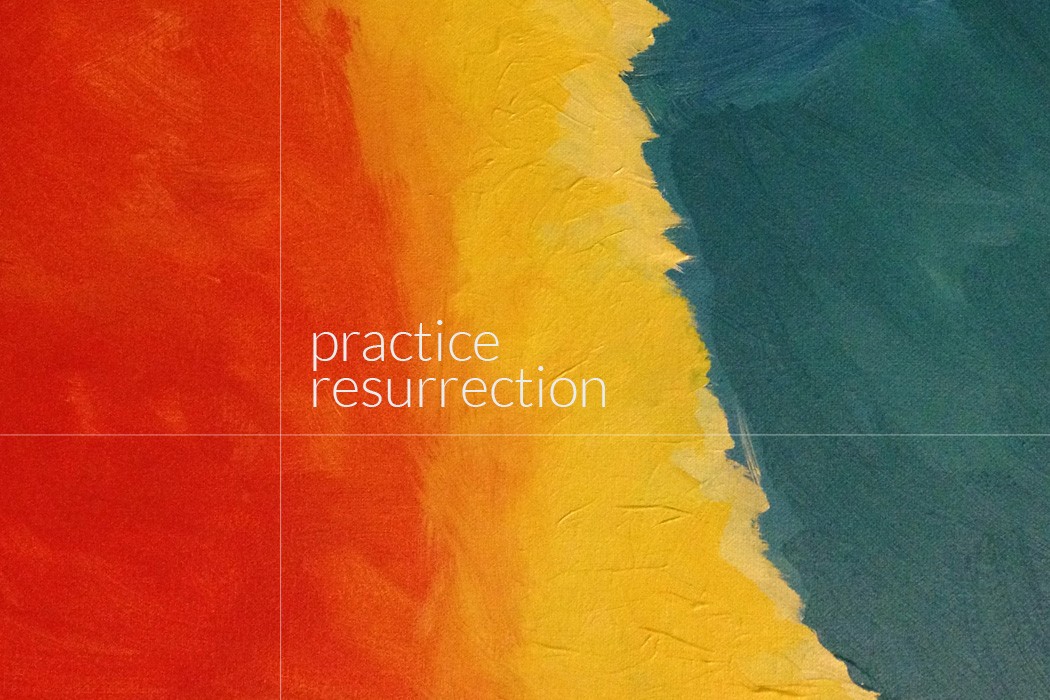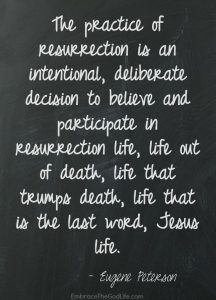
Resurrecting Jesus Today
Rwanda. 1994. Just after Easter. In 100 days over 800,000 Tutsi people are killed by the Hutu majority government. An estimated 70-80% of the Tutsi population. After the genocide was halted by the Rwandan Patriotic Force taking control of the country, an estimated 2 million Rwandans, mostly Hutus who feared retribution, were displaced and became refugees.
The rate of killing during these 100 days was higher than that of the Holocaust. And this mass killing was obviously labeled a genocide.
Now, you probably have some memory of this happening, most likely because of the arguments over whether the US should have intervened. And, you probably remember, President Bill Clinton saying he regretted not stepping in.
Today, I am not interested in what we as a country did or did not do. I am interested in what Christians did and did not do.
You see, by the 1990s over 90% of the population of Rwanda was considered Christian due to the efforts of Catholic, Anglican and Protestant missionaries during the 20th century. Rwanda was arguably the most Christianized country in all of Africa even though it was one of the last to begin to receive missionaries.
Put all this together. The most Christian country in Africa committed the largest genocide in Africa.How does that happen when being a Christian means following a man who taught us to love our neighbors and enemies, who peacefully sacrificed himself for the sake of others, and who brought a message of service, forgiveness, Grace and love? How does one Christian group in a country commit genocide against another Christian group in the same country? What does that mean about the God we serve, the Jesus we follow, the teachings we hold sacred?
Well, i don’t know about you, but it causes me to have doubts…about a lot of things. Doubts about the power of our faith to truly change lives. Doubts about what God is doing if this is the way his people act. Doubts about those Christian missionaries in Rwanda….what were doing and what were they teaching the people of Rwanda?
Yes, it causes me to have doubts: about the people who committed those acts…what kind of Jesus were they following? Is it the same Jesus I try to follow? Or is it a Jesus whose life, teachings, death and resurrection have been distorted? Is it a Jesus who taught and lived out an way of love, Grace, faith, and forgiveness that leads to God? Or are they following some name that is not connected with a particular way of life at all?
Honestly, when I hear stories like this in Rwanda…I fear that many Christians say they follow Jesus when in truth they are following ways that Jesus never taught us and never showed us.
On this Sunday after Easter we traditionally read the story from the gospel of John about Thomas. We like to call him Doubting Thomas. And Most often pastors set up Thomas as a man whose doubt made him a persons of weak faith. These pastors say that we need to heed Jesus words and believe even though we do not see because doing so makes us blessed. The essential message is that doubt implies lack of faith. So do not doubt. Instead trust and believe what you may not see.
Well, if you have not already figured out, I don’t agree. After all, I have now shared with you some pretty serious doubts of my own, haven’t I….maybe something you have never heard a pastor do before. But you see, I have found in my own life that doubt has been a gift that has led me to greater faith.
So I always think Thomas gets a bad rap. Let’s listen to the story again:
When it was evening on that day, the first day of the week, and the doors of the house where the disciples had met were locked for fear of the Jews, Jesus came and stood among them and said, “Peace be with you.”
After he said this, he showed them his hands and his side. Then the disciples rejoiced when they saw the Lord. Jesus said to them again, “Peace be with you. As the Father has sent me, so I send
you.”
When he had said this, he breathed on them and said to them, “Receive the Holy Spirit. If you forgive the sins of any, they are forgiven them; if you retain the sins of any, they are retained.”
But Thomas (who was called the Twin), one of the twelve, was not with them when Jesus came. So the other disciples told him, “We have seen the Lord.” But he said to them, “Unless I see the mark of the nails in his hands, and put my finger in the mark of the nails and my hand in his side, I will not believe.”
A week later his disciples were again in the house, and Thomas was with them. Although the doors were shut, Jesus came and stood among them and said, “Peace be with you.”
Then he said to Thomas, “Put your finger here and see my hands. Reach out your hand and put it in my side. Do not doubt but believe.”
Thomas answered him, “My Lord and my God!” Jesus said to him, “Have you believed because you have seen me? Blessed are those who have not seen and yet have come to believe.”
All the disciples get to see Jesus after the resurrection, except Thomas. And Thomas is really only asking to have the experience the other disciples had….and yeah he kinda throws out an ultimatum …but isn’t that ultimatum about wanting to have the same experience of seeing Jesus that the other disciples had? And I think that is a pretty natural, pretty human response. I imagine I would be quite jealous and want to have that experience too.
What we do know is that Thomas is experiencing doubt. We know this because he is honest about it within his faith community, and even lifts his doubt up and pushes it forward. And this is significant.
Pay attention to the story: what leads to Thomas encounter with Jesus?
Answer: His doubt.
I think we Christians often get this story wrong. Yes, Jesus says, “Do not doubt but believe.” Notice that Jesus does not say those words until (1) after he appears to Thomas and (2) until after he invites Thomas to touch his wounds. Jesus words are not a commandment against doubting, as if doubt is the opposite of faith. No, Jesus Comes to Thomas because of his doubt, invites him to an experience with him and then encourages him to believe!
And I think that is pretty cool. Is says to me, Hey, you need an encounter with the resurrected Jesus in your life? Well, be honest about your doubts…share them….pray them…live them….and Jesus will appear to you.
So I strongly believe that doubts are part of the journey of faith, not an obstacle to faith. No, no. Doubt is a gift. It is part of the receiving of faith. Doubt is what deepens faith. Doubt gives faith legs as it pushes us to the limits of our understanding and guides us into a relationship that is deeper than mere belief.
…………….
This week I wrote a blog about Jesus becoming more than a name. Jesus, as a name, is someone most people know something about. But Jesus for Christians is more than a name…and Easter is the world-altering event through which the man named Jesus fully becomes the messiah, Lord and Savior.
When we Christians decide to become Christians, our decision to follow Jesus the Christ usually – hopefully! – comes when we have our own Easter moment and Jesus becomes more than a name to us. Becoming Christian happens when Jesus becomes more than a name to you, when Jesus becomes your Lord and Savior. I hope you took some time this week to reflect on that moment or series of moments or that consistent journey through which you came to know Jesus as more than a name.

I don’t know about you, but I long for such moments when Jesus rises within me….when I grow spiritually, when I learn more, when My beliefs take deeper root in my life and my faith begins to have legs.
And the truth is we all need those moments. Whether we are Christians living in the United States or Christians living in Rwanda. We need to question who Jesus is to us. What Jesus is teaching us. Are we following a name. Or are we following a savior who saves in a particular way that is marked by love, Grace forgiveness and service to all.
So if a little doubt makes us question and examine the Jesus we are following so that we more closer to the way of Christ not in just name but in deed, then let’s welcome it. Let’s be like Thomas and seek an encounter with Christ. We just might find that Christ is resurrected again in our life. And, after all, isn’t that what salvation is all about?
Brothers and sisters, may we all practice resurrection in our own lives each day as we offer our doubts, questions and struggles honestly and authentically so that we might discover Jesus Christ resurrected in us leading us to life everlasting. Amen.
